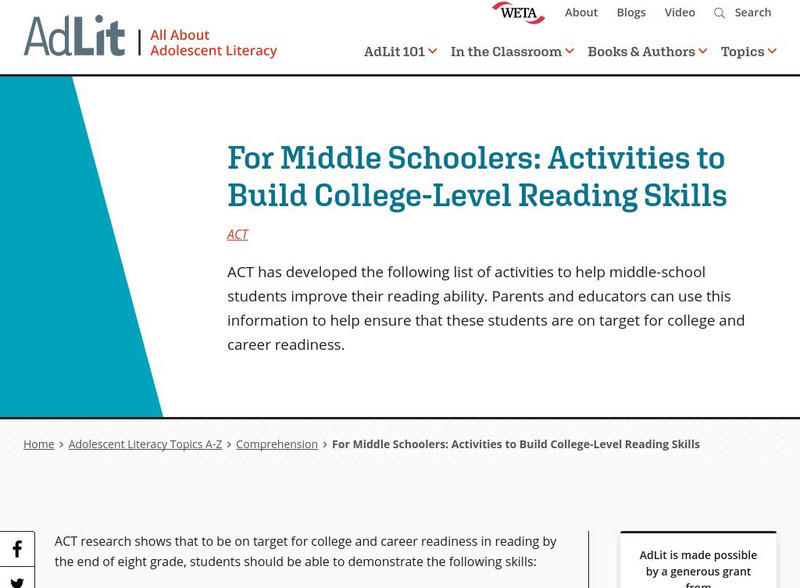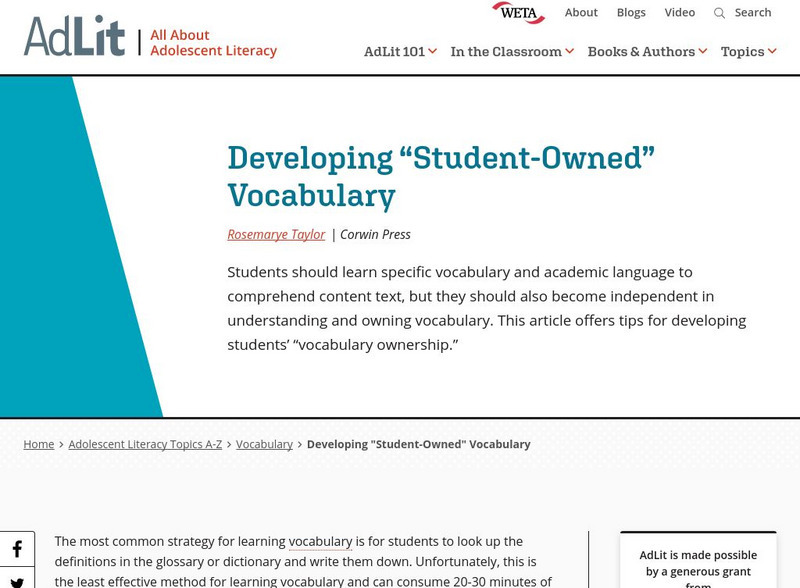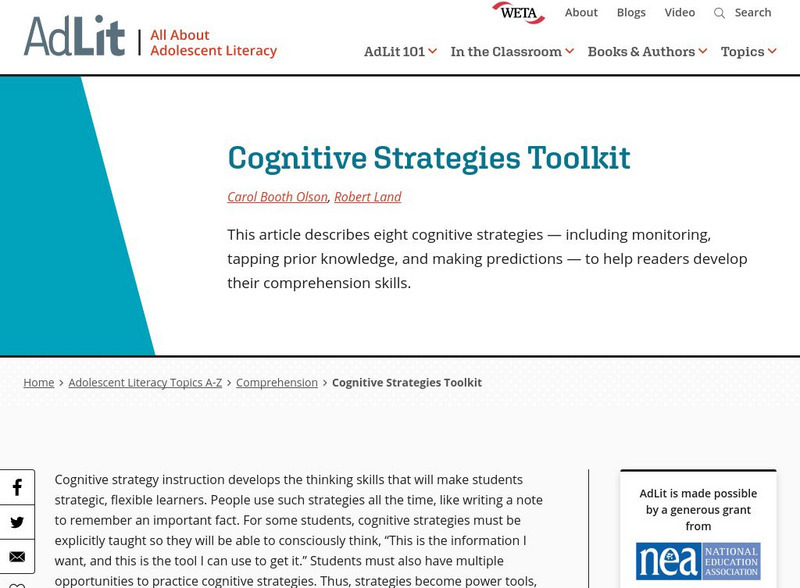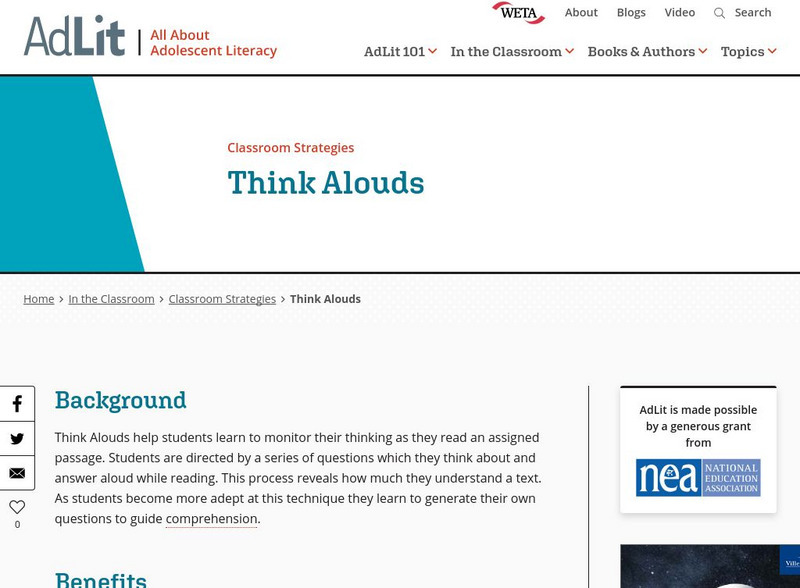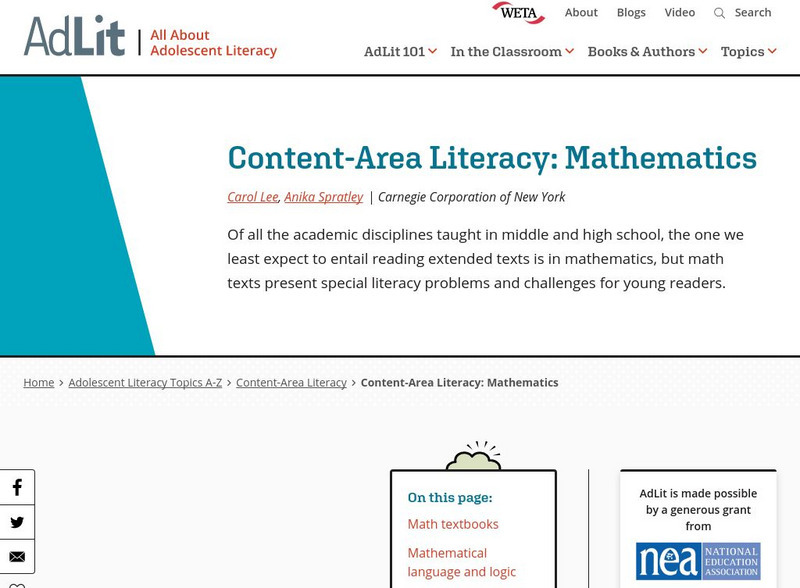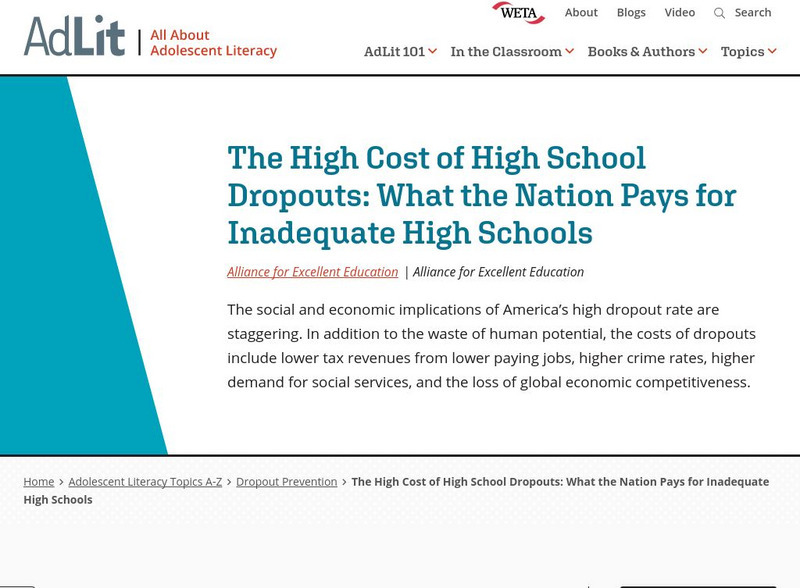PBS
Concept Map
Make the thought process visible with a handy concept map organizer. As learners develop their main ideas in research, writing, or creative development, they can add details and like ideas to the worksheet as needed.
Curated OER
Debate Topics and Ideas
Students examine both sides of arguments surrounding given debates. They use the internet and other research to collect information to support their stand on the controversial issue. Students debate their chosen topic. This lesson plans...
AdLit
Ad lit.org: Seven Strategies to Teach Students Text Comprehension
Comprehension strategies are conscious plans - sets of steps that good readers use to make sense of text. Comprehension strategy instruction helps students become purposeful, active readers who are in control of their own reading...
AdLit
Ad lit.org: For Middle Schoolers: Activities to Build College Level Reading Skills
ACT has developed this list of activities to help middle-school students improve their reading ability. Parents and educators can use this information to help ensure that these students are on target for college and career readiness.
AdLit
Ad lit.org: Effective Reading Programs Grades 6 12: A Best Evidence Synthesis
Many reading programs claim to boost student performance, but how is that measured? Johns Hopkins University examined more than 200 published studies to create this quick guide to programs.
AdLit
Ad lit.org: Developing "Student Owned" Vocabulary
Students should learn specific vocabulary and academic language to comprehend content text, but they should also become independent in understanding and owning vocabulary. This article offers tips for developing students' "vocabulary...
AdLit
Ad lit.org: Cognitive Strategies Toolkit
This article describes eight cognitive strategies - including monitoring, tapping prior knowledge, and making predictions - to help readers develop their comprehension skills.
AdLit
Ad lit.org: Classroom Strategies: Think Alouds
Think Alouds help students learn to monitor their thinking as they read an assigned passage. Students are directed by a series of questions which they think about and answer aloud while reading. This process reveals how much they...
AdLit
Ad lit.org: Classroom Strategies: Monitoring/clarifying
The Monitoring/Clarifying strategy teaches students to recognize when they don't understand parts of a text and to take necessary steps to restore meaning. This technique is a component of the Reciprocal Teaching model in which teachers...
AdLit
Ad lit.org: Classroom Strategies: Inferential Reading
Teaching students to "read influentially" helps them learn how to read more strategically. This technique is derived from the teaching model that learners develop knowledge via the process of interpreting new information in light of past...
AdLit
Ad lit.org: Teach the Seven Strategies of Highly Effective Readers
To improve students' reading comprehension, teachers should introduce the seven cognitive strategies of effective readers: activating, inferring, monitoring-clarifying, questioning, searching-selecting, summarizing, and...
AdLit
Ad lit.org: Key Literacy Component: Text Comprehension
Text comprehension allows readers to extract or construct meaning from the written word. Students who misread words or misinterpret their meanings are at a disadvantage. Proper instruction can boost students' skills in this key area.
AdLit
Ad lit.org: What Works in Comprehension Instruction
The National Reading Panel identified three predominant elements to support the development reading comprehension skills: vocabulary instruction, active reading, and teacher preparation to deliver strategy instruction. L .9-10.3...
AdLit
Ad lit.org: Analytical Writing in the Content Areas
Because writing is thinking, the organization of students' writing reflects both the structure of their thinking and the depth of their understanding. Students should be writing in all their classes, explaining what they know and how...
AdLit
Ad lit.org: Content Area Literacy: Mathematics
Of all the academic disciplines taught in middle and high school, the one we least expect to entail reading extended texts is in mathematics, but math texts present special literacy problems and challenges for young readers.
AdLit
Ad lit.org: The High Cost of High School Dropouts: What the Nation Pays
The social and economic implications of America's high dropout rate are staggering. In addition to the waste of human potential, the costs of dropouts include lower tax revenues from lower paying jobs, higher crime rates, higher demand...
AdLit
Ad lit.org: What Are the Key Components of Dropout Prevention Programs?
Dropout prevention research shows that most programs use more than one type of intervention (family outreach, academic tutoring, personalization and vocational training, for example). While there is no one right way to intervene,...
AdLit
Ad lit.org: What Do We Know About Who Drops Out and Why?
Students decide to drop out for many reasons. This overview classifies the reasons as either status (e.g., age, socioeconomic status, geographic region or mobility) or alterable (e.g., grades, disruptive behaviors, school climate,...
AdLit
Ad lit.org: What Does Research Tell Us About Teaching Reading to El Ls?
In this article, a seasoned ELL teacher synthesizes her own classroom experience and the findings of the National Literacy Panel on Language-Minority Children and Youth to make recommendations for effective literacy instruction of ELL...
AdLit
Ad lit.org: Time Is Not on Our Side: Literacy and Literature for High School El Ls
Given that teachers often have too much to teach and too little time, teacher Dana Dusbiber suggests an alternative approach to teaching literature for secondary ELLs: the introduction of more multicultural literature in the classroom.
AdLit
Ad lit.org: Top Tips for Engaging Dads
The U.K.'s National Literacy Trust offers ideas that schools and nonprofit organizations can implement to get fathers involved in their children's reading.
AdLit
Ad lit.org: Understanding Assessment Options for Idea Eligible Students
The No Child Left Behind law requires each school test students in Reading/Language Arts & Math each year in grades 3-8, and at least once more in grades 10-12. In some cases, children eligible for Individuals with Disabilities...
AdLit
Ad lit.org: The Evidence Suggests Otherwise: The Truth About Boys and Girls
The media has latched on to the story that American boys are falling behind girls academically and are increasingly outnumbered in college. But what do the numbers show? Referencing more than 30 years of test scores and current research,...
AdLit
Ad lit.org: The Why, When, What, and How of Disclosure in a Postsecondary
When you continue your studies after high school, should you tell the school and instructors about your learning disability? This article will help you decide when and how to disclose your disability to obtain accommodations.



